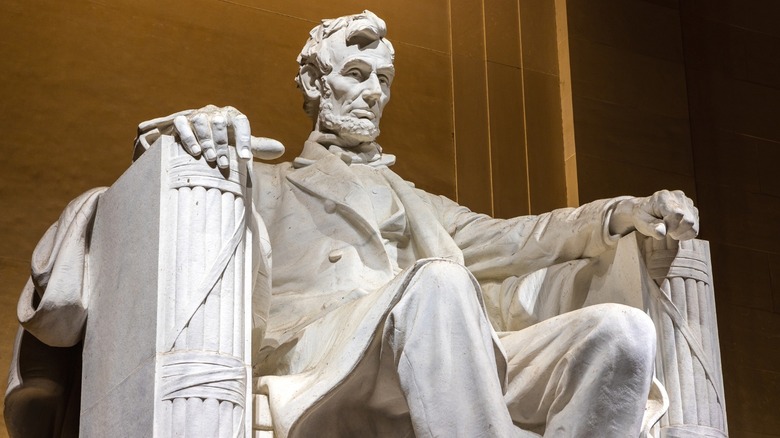This Popular Holiday Cookie Was A Rare Treat For Abraham Lincoln
He's the man on the five dollar bill. The man who led our country through the Civil War and freed the slaves. The man who, as a fighter in his youth, demonstrated one of the first recorded instances of the chokeslam. (Yes, really.) Abraham Lincoln looms large in our nation's history, to the point where he sometimes seems more like a myth than a man. But he was just a man, after all: a man with a complicated relationship with his wife, a startlingly high-pitched voice, and an abiding love of gingerbread cookies. (Although he also enjoyed a cornbread-like snack called "corn dodgers.")
In one of his famed debates against the slavery-defending Stephen Douglas, Lincoln related an anecdote from his childhood. Every now and then, Lincoln said, his mother would get "sorghum and ginger" and make gingerbread men. The Lincolns were quite poor, so this was a rare indulgence, and young Abraham made sure to savor those cookies whenever he could — but one day, he received a dose of perspective when a child from a poorer family came around. He asked for one of Lincoln's three cookies, and, upon devouring his first, asked for another. Although Abe wanted it for himself, he gave the child his cookie anyway, prompting the boy to say something that stuck with the future president: "I don't s'pose anyone on earth likes gingerbread better'n I do — and gets less'n I do." That child's poignant understanding of the world's inherent unfairness is practically tailor-made for political anecdotes — a cynical person might assume Lincoln made it up (although there's no proof that he did), and Lincoln would tell the story often once he became president.
Gingerbread wasn't always just for the holidays
Given the modern connotations of gingerbread, you might assume that Lincoln's story took place around Christmas, but that's not necessarily the case. In fact, gingerbread has been around for centuries, and its current use as a holiday-only treat and/or cannibal propaganda is a relatively recent development. Although the origin of gingerbread is murky (as is often the case with food), it's said that gingerbread originated in places like ancient Greece and Egypt and was first brought to Europe in the 11th century by Crusaders who had just returned from the Mediterranean. (Ginger, after all, was originally an Asian spice.)
Once it made its way to Europe, gingerbread became quite popular, becoming a mainstay of medieval festivals and even getting namedropped by Shakespeare in "Love's Labour Lost." Some people even ate it to soothe their stomachs, the same way many of us drink ginger ale today. (The oldest soda company in the world sells ginger ale, in fact.) As for the specific tradition of holiday gingerbread, which seemed to have sprouted up in several places at the same time, it was a popular food for festivities in general, not just for Christmas. Eventually, gingerbread made its way across the Atlantic with European immigrants, and soon enough, Abe Lincoln and his young friend would share them on one fateful day.

